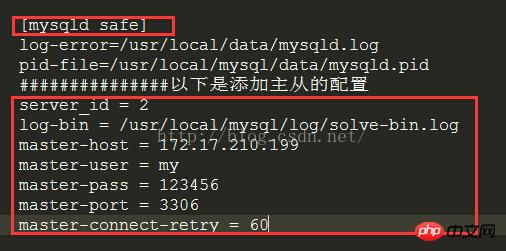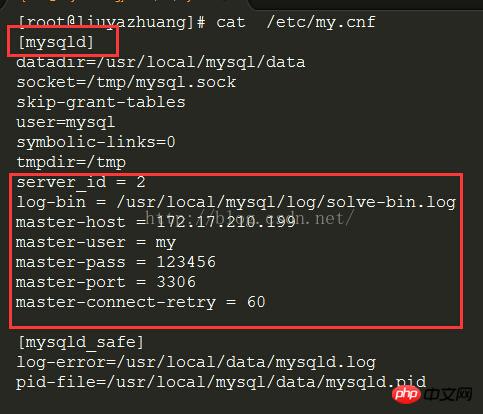 Database
Database
 Mysql Tutorial
Mysql Tutorial
 MySQL-master-slave server-id does not take effect sample code (picture)
MySQL-master-slave server-id does not take effect sample code (picture)
MySQL-master-slave server-id does not take effect sample code (picture)
The database has been set up and all configurations have been completed, but when starting slave ;, an error is reported:
##ERROR 1200 (HY000): The server is not configured as slave ; fix in config file or with CHANGE MASTER TO
Slave: slave IP: 172.17.206.138
First look at the slave 172.17. my.cnf of 206.138
[root@liuyazhuang ~]# vi /etc/my.cnf [mysqld] datadir=/usr/local/mysql/data socket=/tmp/mysql.sock skip-grant-tables user=mysql # Disabling symbolic-links is recommended to prevent assorted security risks symbolic-links=0 tmpdir=/tmp [mysqld_safe] log-error=/usr/local/data/mysqld.log pid-file=/usr/local/mysql/data/mysqld.pid ###############以下是添加主从的配置 server_id = 2 log-bin = /usr/local/mysql/log/solve-bin.log master-host = 172.17.210.199 master-user = test master-pass = 123456 master-port = 3306 master-connect-retry = 60
[root@liuyazhuang ~]$ cat /etc/my.cnf [mysqld] log-bin = /u01/mysql/log/masters-bin.log read-only = 0 basedir = /u01/mysql datadir = /u01/mysql/data port = 3306 server_id = 1 socket = /tmp/mysql.sock join_buffer_size = 128M sort_buffer_size = 2M read_rnd_buffer_size = 2M sql_mode=NO_ENGINE_SUBSTITUTION,STRICT_TRANS_TABLES
Then manually change to Afterwards, the same error is still reported
mysql> CHANGE MASTER TO MASTER_HOST='172.17.210.199', MASTER_USER='test', MASTER_PASSWORD='123456', MASTER_LOG_FILE='masters-bin.000003', MASTER_LOG_POS=120; Query OK, 0 rows affected, 2 warnings (0.04 sec)
mysql> START slave;
ERROR 1200 (HY000): The server is not configured as slave; fix in config file or with CHANGE MASTER TO
1. Check the Mysql error log on SLAVE172.17.206.138, there is this sentence:
141009 6:06:29 [ERROR] Server id not set, will not start slave
That’s strange. I clearly specified the server-id in the configuration file and restarted the mysql service. Doesn’t it work?
Execute the command "show variables like 'server_id';" on the master and slave respectively.
-------View from the slave machinePort
mysql> mysql> SHOW VARIABLES LIKE 'server_id'; +---------------+-------+ | Variable_name | Value | +---------------+-------+ | server_id | 0 | +---------------+-------+ 1 row in set (0.00 sec)
-------Check on the host machine
mysql> SHOW VARIABLES LIKE 'server_id'; +---------------+-------+ | Variable_name | Value | +---------------+-------+ | server_id | 1 | +---------------+-------+ 1 row in set (0.00 sec)
Since the parameter file does not take effect, try setting it in the database command: execute the command on the slave machine 172.17.206.138
mysql > SET GLOBAL server_id=2;
Notice! ! ! Since the "SET GLOBAL server_id=;" command will be lost after the mysql service is restarted, it must be written into the configuration file. But why did the my.cnf file I modified before not work?
After careful investigation, I found that there are [mysqld] and [mysqld_safe] in the configuration. The modified configuration contents were basically placed under [mysqld_safe]. Does it matter if the newly added configuration files are placed in different locations? So I tried to put the modified part in the configuration file under [mysqld], so I changed it to this:
[root@liuyazhuang]# cat /etc/my.cnf [mysqld] datadir=/usr/local/mysql/data socket=/tmp/mysql.sock skip-grant-tables user=mysql symbolic-links=0 tmpdir=/tmp server_id = 2 log-bin = /usr/local/mysql/log/solve-bin.log master-host = 172.17.210.199 master-user = test master-pass = 123456 master-port = 3306 master-connect-retry = 60 [mysqld_safe] log-error=/usr/local/data/mysqld.log pid-file=/usr/local/mysql/data/mysqld.pid


##, synchronize again and it is successful!
mysql> mysql> STOP slave; Query OK, 0 rows affected (0.05 sec) mysql> START slave; Query OK, 0 rows affected (0.00 sec)
The above is the detailed content of MySQL-master-slave server-id does not take effect sample code (picture). For more information, please follow other related articles on the PHP Chinese website!

Hot AI Tools

Undresser.AI Undress
AI-powered app for creating realistic nude photos

AI Clothes Remover
Online AI tool for removing clothes from photos.

Undress AI Tool
Undress images for free

Clothoff.io
AI clothes remover

Video Face Swap
Swap faces in any video effortlessly with our completely free AI face swap tool!

Hot Article

Hot Tools

Notepad++7.3.1
Easy-to-use and free code editor

SublimeText3 Chinese version
Chinese version, very easy to use

Zend Studio 13.0.1
Powerful PHP integrated development environment

Dreamweaver CS6
Visual web development tools

SublimeText3 Mac version
God-level code editing software (SublimeText3)

Hot Topics
 1386
1386
 52
52
 MySQL: Simple Concepts for Easy Learning
Apr 10, 2025 am 09:29 AM
MySQL: Simple Concepts for Easy Learning
Apr 10, 2025 am 09:29 AM
MySQL is an open source relational database management system. 1) Create database and tables: Use the CREATEDATABASE and CREATETABLE commands. 2) Basic operations: INSERT, UPDATE, DELETE and SELECT. 3) Advanced operations: JOIN, subquery and transaction processing. 4) Debugging skills: Check syntax, data type and permissions. 5) Optimization suggestions: Use indexes, avoid SELECT* and use transactions.
 How to open phpmyadmin
Apr 10, 2025 pm 10:51 PM
How to open phpmyadmin
Apr 10, 2025 pm 10:51 PM
You can open phpMyAdmin through the following steps: 1. Log in to the website control panel; 2. Find and click the phpMyAdmin icon; 3. Enter MySQL credentials; 4. Click "Login".
 MySQL: An Introduction to the World's Most Popular Database
Apr 12, 2025 am 12:18 AM
MySQL: An Introduction to the World's Most Popular Database
Apr 12, 2025 am 12:18 AM
MySQL is an open source relational database management system, mainly used to store and retrieve data quickly and reliably. Its working principle includes client requests, query resolution, execution of queries and return results. Examples of usage include creating tables, inserting and querying data, and advanced features such as JOIN operations. Common errors involve SQL syntax, data types, and permissions, and optimization suggestions include the use of indexes, optimized queries, and partitioning of tables.
 How to use single threaded redis
Apr 10, 2025 pm 07:12 PM
How to use single threaded redis
Apr 10, 2025 pm 07:12 PM
Redis uses a single threaded architecture to provide high performance, simplicity, and consistency. It utilizes I/O multiplexing, event loops, non-blocking I/O, and shared memory to improve concurrency, but with limitations of concurrency limitations, single point of failure, and unsuitable for write-intensive workloads.
 Why Use MySQL? Benefits and Advantages
Apr 12, 2025 am 12:17 AM
Why Use MySQL? Benefits and Advantages
Apr 12, 2025 am 12:17 AM
MySQL is chosen for its performance, reliability, ease of use, and community support. 1.MySQL provides efficient data storage and retrieval functions, supporting multiple data types and advanced query operations. 2. Adopt client-server architecture and multiple storage engines to support transaction and query optimization. 3. Easy to use, supports a variety of operating systems and programming languages. 4. Have strong community support and provide rich resources and solutions.
 MySQL's Place: Databases and Programming
Apr 13, 2025 am 12:18 AM
MySQL's Place: Databases and Programming
Apr 13, 2025 am 12:18 AM
MySQL's position in databases and programming is very important. It is an open source relational database management system that is widely used in various application scenarios. 1) MySQL provides efficient data storage, organization and retrieval functions, supporting Web, mobile and enterprise-level systems. 2) It uses a client-server architecture, supports multiple storage engines and index optimization. 3) Basic usages include creating tables and inserting data, and advanced usages involve multi-table JOINs and complex queries. 4) Frequently asked questions such as SQL syntax errors and performance issues can be debugged through the EXPLAIN command and slow query log. 5) Performance optimization methods include rational use of indexes, optimized query and use of caches. Best practices include using transactions and PreparedStatemen
 MySQL and SQL: Essential Skills for Developers
Apr 10, 2025 am 09:30 AM
MySQL and SQL: Essential Skills for Developers
Apr 10, 2025 am 09:30 AM
MySQL and SQL are essential skills for developers. 1.MySQL is an open source relational database management system, and SQL is the standard language used to manage and operate databases. 2.MySQL supports multiple storage engines through efficient data storage and retrieval functions, and SQL completes complex data operations through simple statements. 3. Examples of usage include basic queries and advanced queries, such as filtering and sorting by condition. 4. Common errors include syntax errors and performance issues, which can be optimized by checking SQL statements and using EXPLAIN commands. 5. Performance optimization techniques include using indexes, avoiding full table scanning, optimizing JOIN operations and improving code readability.
 Monitor Redis Droplet with Redis Exporter Service
Apr 10, 2025 pm 01:36 PM
Monitor Redis Droplet with Redis Exporter Service
Apr 10, 2025 pm 01:36 PM
Effective monitoring of Redis databases is critical to maintaining optimal performance, identifying potential bottlenecks, and ensuring overall system reliability. Redis Exporter Service is a powerful utility designed to monitor Redis databases using Prometheus. This tutorial will guide you through the complete setup and configuration of Redis Exporter Service, ensuring you seamlessly build monitoring solutions. By studying this tutorial, you will achieve fully operational monitoring settings



